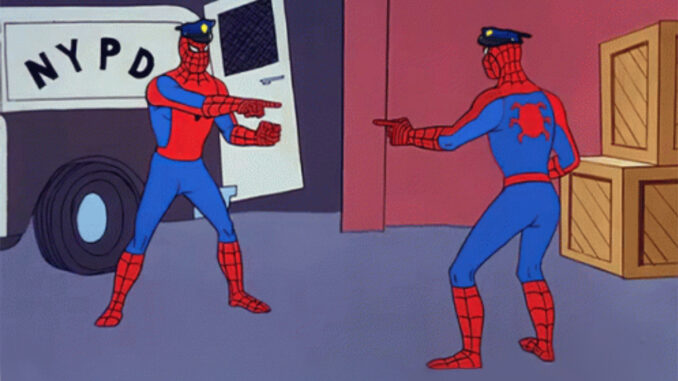
By Shea Stevenson
Spider-Man: Across the Spiderverse, the most recent Spider-Man movie, is as much about cops as it is about anything else. All the main Spider-People have cop dads, the cop dads are the people in danger, the main Spider-People are likened to good cops, and the bad Spider-People act like bad cops.
In a memorable moment, Gwen Stacy (a Spider-Person) said to her cop dad, “The mask is my badge,” a phrase so loaded I won’t be unpacking even half of it here. All of this surprised my partner and I as we watched it. I thought that Spider-Man was predicated on a “friendly neighborhood” everyman quality and that the character was usually at odds with law enforcement. But the more I thought about it, the more I started to wonder if that was ever the case. In other words, has Spider-Man always been a cop?
The matter of Spider-Man – and superheroes at large – being stand-ins for police in their narratives is anything but trivial. Movies are innately political; they say things about their world and about the assumptions baked into it, but more importantly here, they are the most powerful propaganda engines ever devised by humans.
The current language of film editing is steeped in techniques pioneered for propagandistic and advertising (is there a distinction?) purposes. The point of these editing techniques is to elicit a specific predetermined reaction from an audience member and/or convey a static idea to them with each image and sound. When the music swells and the camera shows the hero at a low angle, we cheer, for we understand they are powerful or victorious.
In the past, the dominant form of film – and thus the dominant type of propaganda – in the United States was the Western. Though surely neither the rise of the Western nor the superhero movie is orchestrated by some governmental entity, intentionality isn’t necessary for something to be propaganda. From that perspective, the Western arises not out of a paved path, but from emergent market forces (people went to see Westerns so they made more of them). It shows the mutant exaggeration of what Americans seem to want. The Western is a form of colonialist mythmaking; it is predicated on a fantasy-hero version of manifest-destiny America.
Today, we have the superhero. Emerging from the same market forces as the Western, they are reflections of what Americans want to see. The superhero genre is perhaps most easily read as a form of law-and-order mythmaking; when citizens are in danger, a hero will come along and fight the villain. Although there are many self-conscious twists on this basic formula, as with any genre, it sticks regardless. Notice that this is the same assumption that practically all police media operates under, as well.
Spider-Man is worth singling out because he is the only superhero popular enough to fill out his own entire supporting cast with copies of himself, and he’s done that three times now. He’s also the only hero with particular proven fiscal stability. Even Batman, the nearest contender for a superhero with enough movies that his movies comprise a sub-genre in and of themselves, is not a proven box office smash (think Batman v Superman: Dawn of Justice and Justice League) in the way that Spider-Man always has been. Other characters like Iron Man are tied to a particular actor, without which audiences cease caring about the character. Spider-Man is literally ten different actors in the same movie and people don’t seem to mind.
He is useful as a propagandistic tool for the same reason he’s so beloved: he doesn’t seem like a cop. The basic conception of the Spider-Man character is that of a down-on-his-luck working-class poindexter living a double life. In one, he’s a high school student/reporter, in the other, a famous crime fighter – but importantly, he is shunned for both. Bullied at school, hounded by cops, and lambasted in the news. His defining quality, the one that permeates all of his identities, is that he’s an underdog. The most defining quality of a cop, on the other hand, is their “monopoly” on violence.
As a result, when Spider-Man acts like a cop, beating up shoplifters and handing them to the NYPD to be locked up, there’s an innate tension. Most Spider-Man stories divert this tension to some other element of the dual life, but recently (starting in earnest on film with the Tom Holland Spider-Man), the solution to this tension is to relieve it. Spider-Man works for the government, the Avengers, or otherwise is not self-motivated but directed. Literally, they make him an officer of the law.
In the dichotomy between his poverty and his policing power, the policing power tips the scales and kicks the poverty out of the character completely. The last Spider-Man to have meaningful money trouble was Andrew Garfield’s rendition. It’s little wonder, as well, that many of the MCU’s outings get checks from the Pentagon (as do most movies with military tech in them since the original Top Gun).
Spider-Man has always been a cop, but he started off as a meta-narratively conflicted one. In the ironing out of that character to make him the star child of the superhero industry, all that happened was the mask came off.
